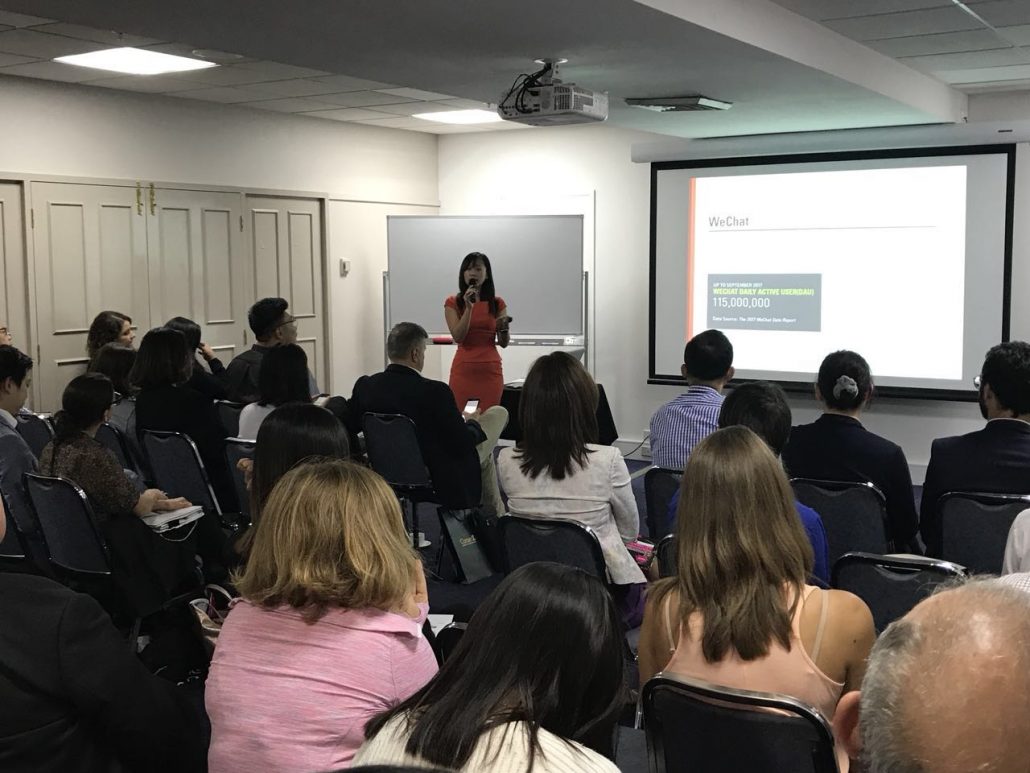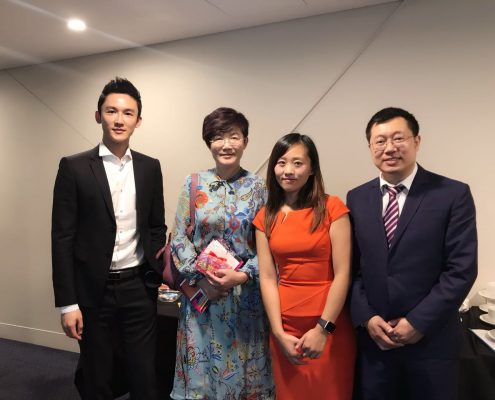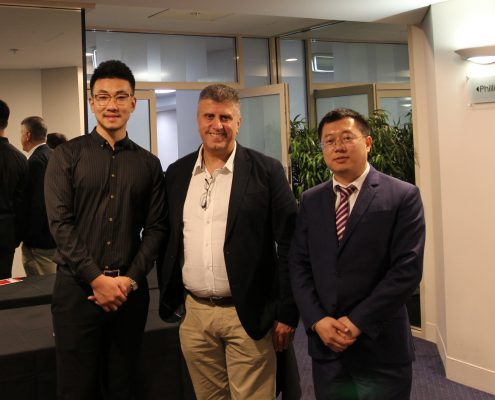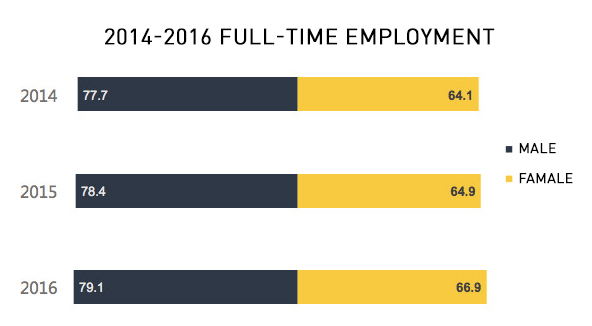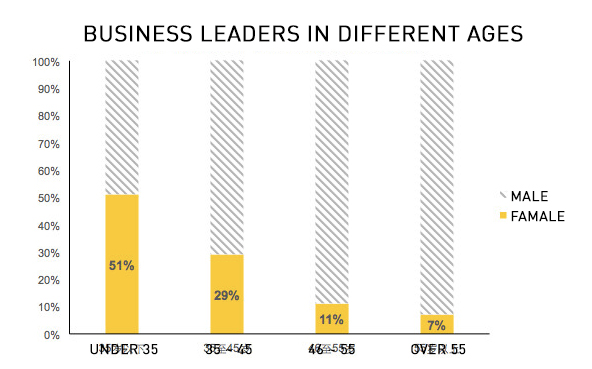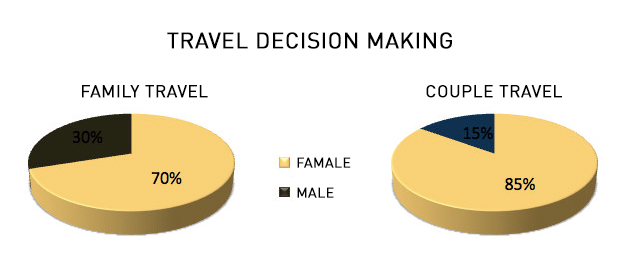Internet celebrities and internet celebrity economy have achieved an extreme expand in popularity becoming the most frequent topic in China. According to China Daily(Sep, 2016), the market size of internet celebrity economy has been larger than the box office in 2016.
What is a “Chinese Internet Celebrity?”
Chinese internet celebrities, known as “Wang Hong(网红)”, are people who have become famous on Chinese social media and online communities especially those who has the abilities to advance their internet traffic to real cash. Internet celebrity economy means the business chain of internet celebrities which includes incubators and agents, support teams and platforms, online marketing strategies as well as product selling methods.
Different with pop stars, models, actors and traditional KOLs, internet celebrities represent strong personalities on the social media and online community. They share their lifestyle, experience, and opinions on their channel frequently, keeping interaction with fans and guide them to shops, brands or other goods and services. Fans then become willing to follow the suggestions as they feel internet celebrities are a representation of higher cordial and friend-like than pop stars and traditional KOLs. Most Internet celebrities are not professionalist. However, they admit stronger influences and achieve strong effectiveness in specific areas. Dayi Zhang, one of best known Chinese internet celebrity, defining herself as a model and fashionistas with a great amount of five million fans on social media channels. Furthermore, in the ‘Bachelordom Day’ 2016, she presented herself on TaoBao livestream show, guiding her audiences to the fashion store and brands of Taobao, this made a huge amount of 100 million sales on the day.(Ebrun, 2016) BBC news(Aug 2016) points out that Zhang’s income has reached 46 million US dollars, which is the double amount of the top Chinese actress Bingbing Fan.
The History of internet celebrities in China
The reasons why internet celebrities in China accomplish such influential results are actually complicated. The situation is formed by the highly developing of internet technology, unique pop culture background, and the rapid economy growing.
In the past twenty years internet technologies especially social media, e-commerce, and mobile applications have been highly developed in China. Based on research of CNNIC(2015), China obtains 6.49 billion internet users by the end of 2015. This includes at least 5.57 billion users uses mobile to access the Internet for purchasing and social behaviours.
As a high population in the society of the new generation agrees and sticks more to the enjoyment of indoor entertainment, the Internet has become a major path of entertainment for the decades. From the early 2000s, community websites, esports games, and online videos are the pop culture of China’s young generation, especially for university students. The internet users who obtain an advantage in commenting games, the creating interesting content, or writing in web fictions are instantly becoming famous on the community of websites as well as video websites. They are the prototype of the Chinese internet celebrities that are present in nowaday fashions.
After 2010, the strong force of social media and eCommerce are growing rapidly also effectively in China. Social media users share photos of their lifestyles on the internet such as food, makeup products, fashions, and pets. Part of them became internet celebrities due to their experiences in makeup or collocation of fashion. Many shop owners of Taobao particularly the fashion store owners immediately took notice of the great chance to promote their products by becoming internet fashionistas in order for them to work towards the creation of firm relationships with customers on social media and collects attention from them to purchase the owners store and brands. Some content creators also transfer from website communities to social media because they believed it was a faster result to spread their jokes, comics, comments as well as articles. In the same year the influence of Japanese animation which was another Chinese teenager and young adults way of entertainment also barrage video websites(known as “Danmu-video site”, which contains a real-time commentary subtitle system that displays user comments as streams of moving subtitles overlaid on the videos playback screen) became popular as it is a combination of functions of video sites also online communities.

Barrage Video
Some alterations of internet celebrities are the change from traditional video website to barrage video websites in order to seek for greater traffic and better interaction experience.
In 2014, livestream websites and applications spread out rapidly in China. Different with traditional video, livestream allows the uploader to make a real-time video containing a comment system to interact with the audience. The esports game commentators and advantaged appearance of teenagers were the first type of group of video maker. The majority of them gains popularity and collects money from fans’ tips(known as “Da Shang 打赏”). As more accessibility introduced, fans became more devoted to internet celebrities even greater than actual celebrities of actors and/or models also top musicians. Some shop owners of Taobao and ‘DaiGo’(people who consumes product to sell to a different area which does not provide those certain goods) develops that live streams can be another effective marketing method to promote their products , therefore, they also became a part of livestream celebrities in order to earn considerable traffic for their stores and successfully converts their fans to the real money. Furthermore, due to the efficient developments growing in mobile device and applications, social media and online videos have covered a large percentage of China’s population of different ages and careers. In regard to developing reactions to this large amount of traffic, a new generation of KOLs based on the internet has approached and introduced to the market. They can be found in all industries such as finance, health, IT also military. This generation is raising with high speed across the online community and become parts of internet celebrities, providing and supporting their opinions to their fan, usually for commercial purposes.
The impact of internet celebrities and the success of Taobao store owners effectively attracts the attention of all industries in China. In 2015, ‘ALIBABA’ begin his new strategy to blend in with social media with e-commerce of the core idea for the marketing of internet celebrities. Comparing with the original market resolution of celebrities, internet celebrities strategy processes with lower cost and higher accurate marketing. Wang(2016) points out that although China’s economy is slowed down in 2016, the revenue of Taobao also Tmall are continuing dramatically rising due to their advantages in internet celebrities strategies.
Alibaba is not the only successful example. Livestream platforms, social medias and video sites have all realised the influence and potential value of internet celebrities, therefore, begins to develop their own strategies also effective resolutions. Up to the beginning of 2016, Chinese companies has created a completed business chain of internet celebrities called “internet celebrities economy”, related to the internet celebrities incubator, internet celebrities agency, investor, social media platform, e-commerce website as well as advertising agencies. Throughout this business chain, internet celebrities are responsible for the role of traffic container. They fill themselves with the traffic from social media and video platforms then proceeds the auction of the traffic to platforms, brands, companies also online stores in order to accomplish their commercial needs.
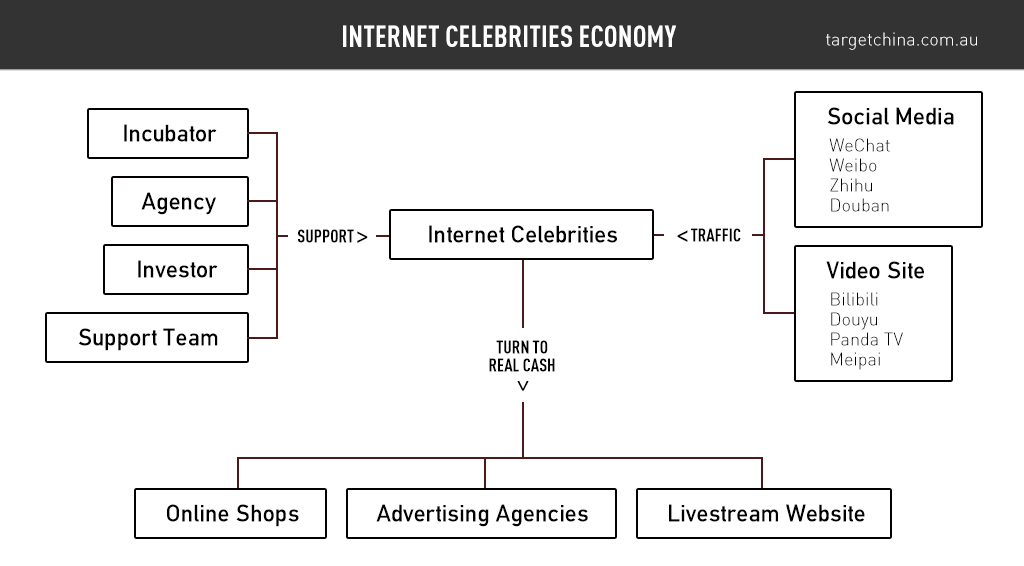
There are other influential factors causing the phenomenon of internet celebrities. One of the reasons of the contribution is traditional KOLs are more likely to lose trusts from Chinese society. From the 2000s, there are some traditional KOLs especially certain professor and professionalist presenting ridiculous and unsuitable opinions to the academic reports, interviews of news also TV shows which then burn up and negatively affected the audiences. Some Chinese audiences believed that professors and professionalists are equivalent to idiots(known as “zhuanjia 砖家” and “jiaoshou 叫兽”). As a result, audiences are more considerable to internet celebrities as they are more “professional” and has further advantages of friend-like and affable.
Another extensive reason is that Chinese people enjoy the feeling and communication of sharing lifestyles. They are positive to notice and value different stories from others. An great example is Fulin Fang, who’s from British but can fluently speak Chinese. He insists on updating his video blog on Bilibili video website, mentions about the difference between England and China. Recording his daily life in Europe and discuss the British English accent also pronunciation. With less than one year he achieved the amount of one million fans on Bilibili as well as hundreds of thousands followers on Weibo and WeChat.
Types of Chinese internet celebrities
There are three general types of internet celebrities in China: content creator, product sales, and controversial figures.
Content Creators
The first type is the content creator, including bloggers, writers, illustrators, KOLs, commentators, photographer, livestream host and video makers. They cover topics of lifestyles, finance, technology, literature, culture, fashion also entertainment and can be further classified based on the different type of media they use. The most common medias are social media application and community websites such as WeChat, Weibo and Zhihu. The creators are usually encouraged to share personal experiences or write articles on these channels. The users who produce high-quality content are more likely to attract a greater amount of audiences and followers and becomes online internet celebrities.
Weibo and WeChat are the largest and most popular social media channels in China that created plenty of internet celebrities. WeChat is a free, cross-platform and instant messaging application released in 2011. Although Wechat is a private social channel, its official account function can be consumed in the public channel. It provides content creators a blog system which allows to release and share the articles with their followers. According to WeChat’s official report in 2016, it reached 10 million official accounts and over 60% of the WeChat users are more like to read news as well as articles from the official account instead of TV, magazine, and newspapers.
Comparing with WeChat, Weibo is supposed to be more efficient on gaining fans and spreading articles. However, as Weibo does not have a serious verification system on registration and commenting, therefore, fake fans and meaningless comments can be massly produced by soft programs. It is not a secret that some websites and companies make use the software to produce Weibo fake fans and fake comments to provide them to people who desires to become an “internet celebrity” instantly without any effort. (China.com, 2014) Baidu Baike states, there are a certain amount of Taobao stores selling the fake fans of Weibo services online with the price of 4 dollars for 2000 fans. As a consequence, Chinese social media users appears to lose trust in internet celebrities on Weibo as they suspect unfamiliar accounts that whether their fans factual. Moreover, the content on Weibo was limited to 140 characters, which requires higher skills in order for the creators to develop quality contents. On the other hand, WeChat Official account doesn’t have many limitations on characters, images, audios and videos which provide users with a simplified and advantaged reading experience also make users gaining the feeling of professional.
As a commercial consideration, internet celebrities on social media and online communities generally select stealth advertising as the way to switch fans into real money. Different with Western users, Chinese users heavily dislikes seeing any form of display advertising, especially from an official account. Tieba, which was the top ranking community website had tried to insert display advertisements under the comment that contains specific keywords. For example, if a user posts a comment including “car”, an advertisement of a car will appear under that comment. This action caused the anger and negative attitude of Tieba users. As Tieba charges business owner every time when the advertising appears, various amount of users deliberately mentions the keywords in the comment as they believe their actions may result in the business owner realizing the expense and uselessness of the advertisements.Some users may even appear to write inappropriate quotes such as “the next comment is written by my son” then adds the keywords to joke on the business owner. Moreover, a few months after the advertising campaigns brand or title, Tieba fell to the second of community websites ranking due to the transfer of users to Zhihu. It was the second in placement and announced that they never display any sort of advertisements. As Chinese content creators clearly understanding of the possible damage caused by making display advertising, they usually hide the advertisement in the articles or use other attractive ways to represent the advertising content. This form of stealth online advertisement are more acceptable and had positive reflections from clients.
In the later of 2014, the traffic of traditional video websites starts to fall down. Instead, livestream websites and barrage video websites begin to expand and increase in popularity. Bilibili, the most popular barrage video website, defeating Iqiyi in 2016, became the No.1 ranking video platform in China. Found at 2010, Bilibili was only focusing on Japanese animation and its related videos. With the growth of audiences, a wide range of content such like sports, lifestyles, movies, TV drama and handcrafts was added. Afterward, Bilibili became a comprehensive video website.
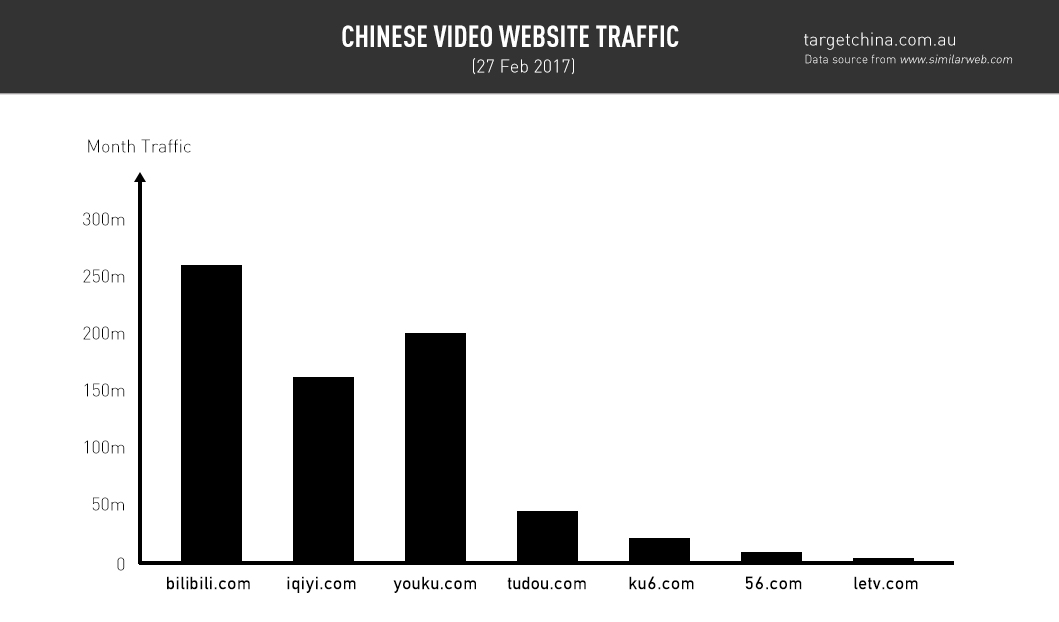
The key points of Bilibilis’ success are that this program consistently catches the pop culture and builds up the kindly environment as well as strong support for internet celebrities. Video creators in China are also particularly enjoying the content of Bilibili. This provides results that Bilibili contains a firm relationship with both audience and content creators in the current new Chinese generation and will also take the following generations with positivities in the future. The internet celebrities on Bilibili are not only Chinese but also foreigners. Introduced by local students and friends, oversee students in China and Chinese learners over the world whom also are a part of audiences in watching videos on Bilibili. Some of those audiences become internet celebrities by uploading their own videos which are certainly rare on other social media channels or video websites.
Livestream is another popular type of video platforms in China. After the explosive growth in 2015, livestream websites has kept on increasing throughout 2016. Li (2016, Sohu) points out, up to the end of 2016 there was more than 300 live stream platforms and half of it has completed capital financing. Among these platforms, the valuation of Panda TV, Chushou, Douyu are over 1 billion(Li, 2016).
The greatest amount of population of internet celebrities performing on livestream platforms is mainly game players, game commentators and young beauties. Due to the booming of e-sports game in China in recent years, livestream became a perfect way to broadcast the live game contents especially the game competitions. According to Hanson(2016), throughout 2016 a percentage up to 92% of Chinese young population watches the competition online from the number of 87.6% in 2015. Similar to traditional sports games such as soccer, basketball and tennis, e-sports games require a high standard of skills and techniques for games which are delight and entertainable for people to watch. The esports players are confident and positive to share their game on the livestream, discussing the skills and techniques they used. Consequently, skilful players and experienced commentators change into internet celebrities which are followed by other esports game fans.
Another type of internet celebrity is who plays entertainment video games and present them on livestreams. Different with the esports players and commentators, they don’t have the qualified skill and techniques but plays various type of games. They present the games for people who are short in time or unwilling to purchase the software. They perform the game on live and provide audiences with the enjoyment of the game content even if the audiences don’t have the opportunity to. Moreover, the players and audience often discuss the game through the video, this makes audiences to obtain the feeling of actually operating the games.
Users of livestream websites and barrage video websites are not paying as much as social media and online community website towards advertisements. And in most situations, a short display advertising is tolerable. Many content creators on these video websites are also capable of the knowledge to create the display advertisement into something more interesting, catching and acceptable. Comparing with Wechat and Weibo, video promotion can reach more targeted audiences and invest higher conversions rates.
Young beauties as internet celebrities are another type of content creators on livestream who are controversial in China. Most of these advantaged appearance people who meets the beauty standard of nowaday society performs by dancing, singing or simply communicating with the audience throughout the livestream and majority of their fans(mostly male) are willing to “tip” them from one to millions of dollars. Part of those beauties further decides to wear inappropriate fashions, talking or performing with a strong sexual suggestiveness that directly aiming at attracting more male fans for tips. Shi(2016, Sina) points out that these beautiful young ladies are “playing edge balls”. They are fitting into the audience’s sensory needs with beautiful appearance, stimulating their desires and leading them to tip.
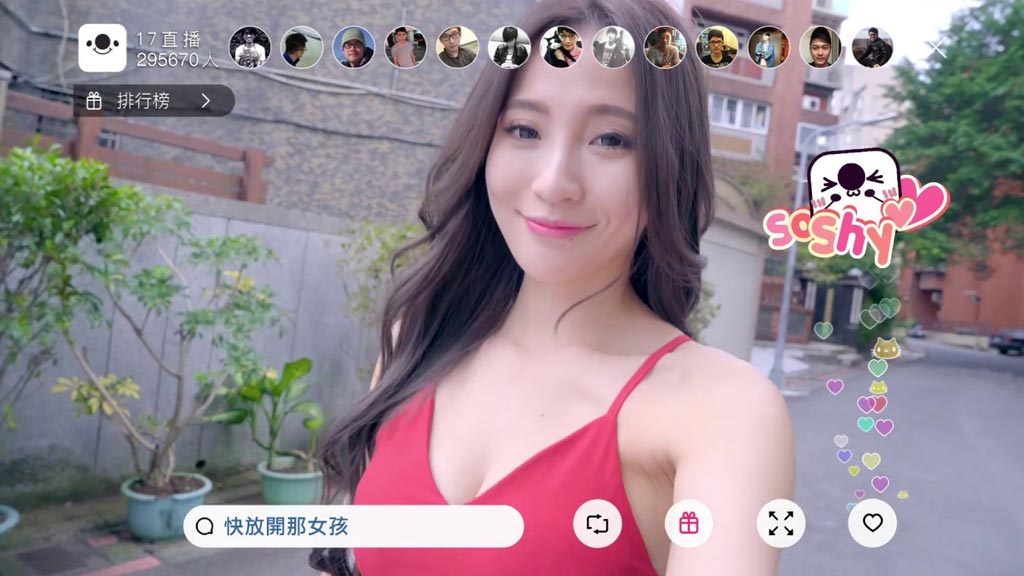
In fact, these young beauties also believe an attractive appearance is a key to achieving fans and income and due to this a development of standard beauty face called the “internet celebrity faces”. This title is mainly created by makeups and plastic surgery also injections. Tsoi(2016, BBC) states that a pair of doe eyes, a pointy chin, a high nose and fair skin become a “standard face” of female internet celebrities in China. They believed that the “internet celebrity faces” are one of the most effective weapons which can support them to attract male audiences. Additionally, the recent reports appear that handsome and attractive male internet celebrities who sings and dances on livestream website are also dramatically rising and the majority of their audiences are female.
Product Seller
Before Alibaba launched its internet celebrity strategy, some Taobao shop owners already realised the importance of raising their own reputation on social media. They are the first generation of product sellers in the title of internet celebrity. They introduce products on social media with their Taobao store links. They don’t only speak about the advantages but also presents their followers the stories and their using experiences of the product which is a high effective way to guide the followers to purchase goods.
Due to the successful history and results of Taobao shop owners, Alibaba believes that it could be an effective strategy for product promotion and sales. Starting in 2015, Alibaba established an education facility to mass produce internet celebrities as their next generation salesmen in order to work towards Taobao and Tmalls. After one year of the process of the strategy, with the contribution of these internet celebrities, Tmall reached a 100 billion sales in a single day on the 11th of Nov 2016 which became the largest sales record in e-business history. Alibaba has also developed their own livestream system which allows the customers to order the products while they are watching the real-time video by the internet celebrities. Furthermore, Alibaba provides the internet celebrities rental services for the Tmall store owners who desires to promote their shop and products, besides the general rental fee, internet celebrities can also share the profit from the promotion activities.
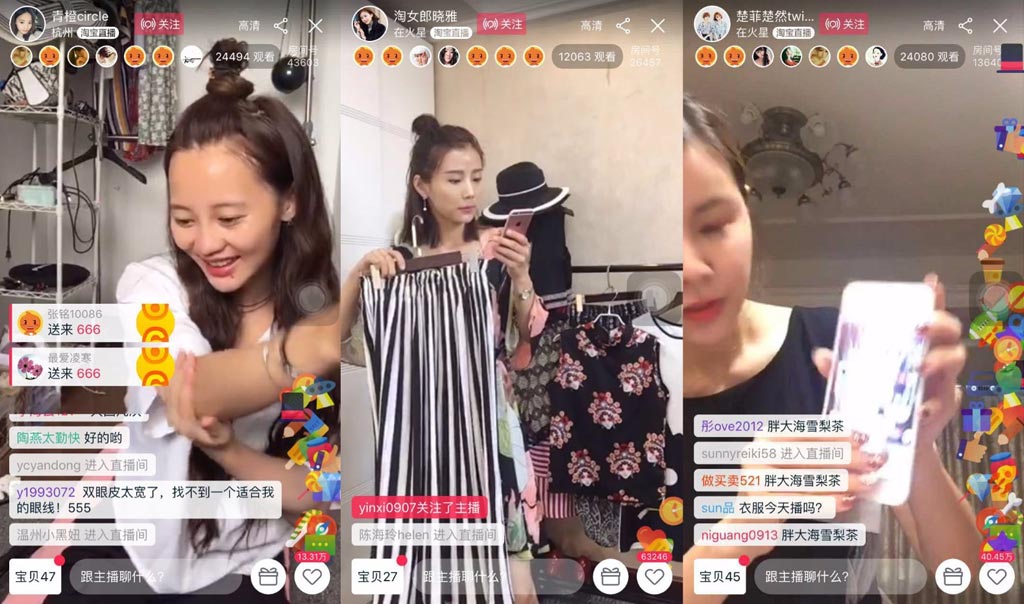
Internet Celebrities sell products on Taobao app
Alibaba is not the only online platform who promotes the sales of the products with internet celebrities, Weibo and Douyu are also have their own product selling system. Weibo allows their contracted internet celebrities to create a “product showcase” on their personal page with links of the goods from the Taobao store. Douyu provides a game purchase function while the audience watches the live stream of famous game players performing the exact game. This strategy of training and attracting more internet celebrities so their traffic can be transferred into real money has become the most significant theory of Chinese online social platforms and e-business websites.
Public Figure
Besides the content creators and product sellers, some public figure either proactive or involuntary as a result to become famous across the internet. For example, Sicong Wang, the son of China’s wealthiest man Jianlin Wang is highly controversial through the internet due to his fortune and outspoken personality and this lead to him obtaining 22 millions followers on Weibo also was placed on the top of “The Most Popular Internet Celebrity in 2015” ranking list.
How to use internet Celebrities in China marketing campaign
Maggie Zhou, the managing director of Alibaba points out, the celebrity marketing is the key to for Australian companies to achieve the success in China market(Evan’s 2016). As a significant part of celebrities, internet celebrity is one of the most powerful weapons for Australian enterprise to meet Chinese clients beside the movie stars, pop singers and TV hosts. Compare with traditional public figures, internet celebrities marketing has a lower cost and a higher conversion rate. It is one of the best precision marketing solutions in China, especially for the small companies and startups. Up to March 2017, there are hundreds of famous oversea enterprises cooperate with Chinese internet celebrities to promote their products, include Microsoft, Samsung, Pizza Hut, and Colgate.
A great example of precision marketing is the new product promotion of Pizza Hut shanghai branch in spring 2017. Pizza Hut cooperates with Afu, a German young man who is famous on Bilibili video website, to promote their new Pizza. Afu is living in Shanghai and married with a Shanghai lady. He uploads videos talking about his life experience in Shanghai and earn more than two hundreds thousands fans on the social media channels. Because of he can speak fluid Chinese with nice ShangHai accent, his fans mostly are Shanghai young people, which is perfectly fit with Pizza Hut’s target market.
As some internet celebrity are actually acting the role of salesmen, their value can be represented by the raising of sales in a short term. Furthermore, compared with superstars, the general price for each advertisement produced by internet celebrity is much lower, which is usually around 1% to 5% of superstar advertising fee. These two characteristic extremely reduce the risks of the promotion campaign. However, it is difficult for a single internet celebrity to attract such high traffic as a superstar and the internet celebrity is hardly to keeping the reputation for years. According to Target China Celebrity Database, although there are a few successful internet celebrities who have been ranking on the top over five years, the most are popular for only one or two years. As a result, the strategy of internet celebrity marketing is totally different with superstar marketing which the keypoint is always selecting a group of internet celebrities for a total of larger traffic, higher conversion rate and cheaper cost. It is vitally important to choose the suitable internet celebrities to fit your industrial, and the campaign needs to be updated at least every half year basing on the new business purposes and the repetition change of the selected internet celebrities.
Similar with superstar endorsement, internet celebrities marking also has the function of improving the image and awareness of a brand. However, not all the internet celebrities are suitable for each enterprise. An inappropriate choice will outcome little and even bring negative effects. Especially for the content creator, who has very strong personality in the public. In addition, To ensure the strategy can work successfully, the advertiser need to fully communicate with the selected internet celebrities, make sure they exactly understand your products or services, so they can develop the correct content.
The selection of social media channels is another important factors need to be considered when designing the campaign. Most western researchers only know Wechat and Weibo which are the most famous in China, however, they are only the tip of the iceberg. Up to the March of 2017, there are more than one hundred popular social media applications and websites in China, most of them have complete the first significant round of venture capital financing and have built their own loyal customers groups.
As social media marketing is culture based, especially the personalised networking taking a significant position in China, to understand the whole picture of internet celebrity is extremely difficult for western people. Unless you are highly experienced in Chinese social media promotion and internet celebrities marketing, to work with an agency, such like Target China, will save you money and time and achieve better outcomes.
Conclusion
Internet Celebrities has dramatically changed the ebusiness structure in China. Start from the beginning of this century, Chinese online channels experienced several revolutions. Users were sticking on online communities and general video sites now moving to social medias, livestream and barrage video websites. These medias come out a considerable amount of internet celebrities as a background of highly developing in internet technology, unique pop culture background and the rapid economy growing.There are three types of internet celebrities including content creators, product sellers and public figure. The content creators are working on different channels to deliver the visual contents including article and video to their followers. As Chinese audience dislike display advertising, they usually transfer fans to money by stealth advertising. Product sellers started from Taobao owners, then mass produced by Alibaba and other online ebusiness platforms. They are specialising in building good relationships with followers and guiding them to the online shops on livestream. Additionally, some controversial public figures are famous on the internet as well.
Internet celebrities are necessary marketing method for Australian companies to promote the brands and products to China market. Different with traditional stars, to achieve a considerable outcome, multiple internet celebrities will be involved in the campaign. However, to design a successful strategy requiring a highly understanding of Chinese pop culture, and well Chinese communication skills. The best choice of the western enterprise to arrange a campaign is to find an experienced agency such as Target China.
Internet Celebrity is the future of online selling and marketing in China. They are the mediators of business activities, internet traffics and personal relationships which are the major factors of Chinese online business. It can be predicted that internet celebrities will keep the significant position in the Chinese social networking for years unless the Chinese business environment Changing or new technologies appearing.
